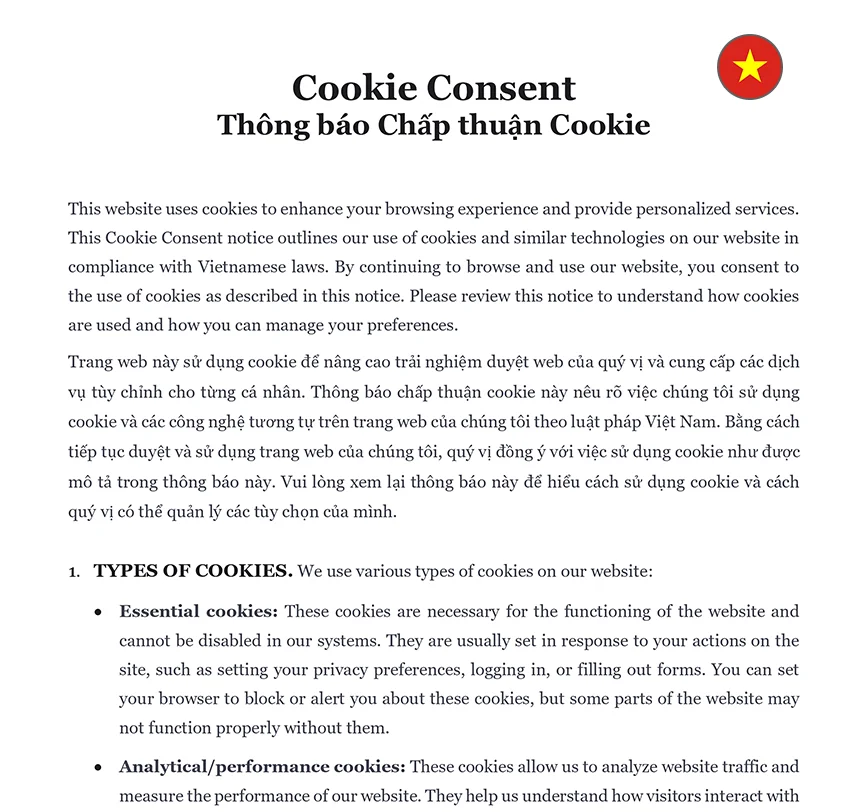Ready to use legal template
Drafted by experienced lawyers
Vietnamese-English translation
Ready to use legal template
Drafted by lawyers
Vietnamese-English translation
Home › Intellectual property › Cookie Consent
Learn more about Cookie Consent in Vietnam
A Disclaimer stands as a crucial tool in the realm of law, serving to delineate and mitigate potential liabilities by outlining the boundaries of legal responsibility. Whether you’re a business owner, a content creator, or an individual seeking to protect your rights, our comprehensive range of Disclaimers is tailored to meet your specific needs. Developed by our team of seasoned legal experts, each Disclaimer is meticulously drafted in strict accordance with the intricate legal landscape of Vietnam. Presented in an easily editable Word format, our Disclaimers empower you with the flexibility to customize and implement them seamlessly into your operations. With Themis Partner, rest assured that you’re equipped with legally sound protections that align perfectly with Vietnamese regulations. Explore our collection today and take control of your legal compliance effortlessly.
Table of contents
-
What is Cookie Consent?
-
What is included in a Cookie Consent?
-
Why is Cookie Consent important for websites and businesses?
-
What are cookies, and how do they work in Vietnam?
-
What is the legal basis for requiring Cookie Consent?
-
Are there different types of cookies that require varying levels of consent?
-
Are there penalties for non-compliance in Vietnam?
-
What if I don’t have a Cookie Consent in Vietnam?
What is Cookie Consent?
Cookie Consent refers to the practice of obtaining permission from website visitors or users before storing or accessing information on their devices through cookies. Cookies are small text files that websites place on users’ computers or mobile devices to collect data about their browsing behavior, preferences, and interactions with the site. Cookie Consent mechanisms typically involve notifying users about the use of cookies, explaining their purpose, and requesting users’ explicit consent to proceed. This consent is usually obtained through a pop-up banner, notification bar, or similar interface, allowing users to either accept or reject the use of cookies. Cookie Consent is essential for ensuring compliance with data privacy regulations, such as the General Data Protection Regulation (GDPR) in Europe, and for respecting users’ rights to control their personal information online.
What is included in a Cookie Consent?
A Cookie Consent typically includes several key components to ensure compliance with data privacy regulations and to provide transparency to users. These components often include:
Notification: A clear and conspicuous notification informing users that the website uses cookies. This notification should be prominently displayed and easily noticeable to users.
Purpose: Information about the purpose of the cookies being used, including what data they collect, how they are used, and why they are necessary for the website’s functionality or for specific purposes such as analytics, advertising, or personalized content.
Consent Mechanism: A mechanism for users to provide their consent to the use of cookies. This can be in the form of an “Accept” button, a checkbox, or a similar interactive element that users can click or interact with to indicate their consent.
Options for Consent: Options for users to choose which types of cookies they consent to, such as essential cookies, functional cookies, or marketing cookies. Users should have the ability to accept or reject specific categories of cookies based on their preferences.
Withdrawal of Consent: Information on how users can withdraw their consent at any time and disable or delete cookies through browser settings or other means provided by the website.
Link to Cookie Policy: A link to the website’s Cookie Policy or Privacy Policy, where users can find more detailed information about the types of cookies used, how data is processed, and their rights regarding data privacy.
Language and Accessibility: Cookie Consent should be presented in clear and understandable language, and it should be easily accessible to all users, including those with disabilities.
Record Keeping: Mechanisms for the website owner to keep records of user consent, including timestamps, user actions, and consent preferences, to demonstrate compliance with data privacy regulations if required.
By including these components in a Cookie Consent mechanism, website owners can ensure transparency, user choice, and compliance with data privacy laws.
Why is Cookie Consent important for websites and businesses?
Cookie Consent is crucial for websites and businesses for several reasons:
| ➤ Legal Compliance: Many countries have laws and regulations that require websites to obtain user consent before placing cookies on their devices. For example, the General Data Protection Regulation (GDPR) in the European Union and similar laws in other jurisdictions mandate transparent cookie practices and user consent as part of data protection requirements. Compliance with these regulations helps businesses avoid legal penalties and maintain trust with users. |
| ➤ Respect for User Privacy: Cookie Consent promotes transparency and empowers users to make informed decisions about their online privacy. By providing clear information about the types of cookies used and obtaining user consent, businesses demonstrate respect for user privacy preferences and foster trust with their audience. |
| ➤ Enhanced User Experience: Implementing Cookie Consent mechanisms allows businesses to tailor their cookie practices to user preferences. Offering options for users to accept or reject certain types of cookies enables a more personalized and user-friendly browsing experience. Users who feel in control of their data are more likely to engage positively with a website. |
| ➤ Mitigation of Risks: Obtaining explicit consent for cookie usage helps mitigate risks associated with data breaches or unauthorized data processing. By adhering to Cookie Consent best practices, businesses can reduce the likelihood of legal disputes, regulatory fines, and reputational damage resulting from non-compliance or privacy violations. |
| ➤ Competitive Advantage: Demonstrating a commitment to data privacy and user rights through robust Cookie Consent practices can differentiate businesses from their competitors. Ethical data handling practices and transparent communication about cookie usage can attract and retain customers who prioritize privacy and security in their online interactions. |




